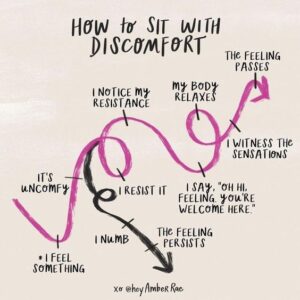The Idea of the Week
Task paralysis refers to an experience of feeling overwhelmed, stuck, or unmotivated that interferes with completing a task, and thus you might avoid the task by procrastinating. It may also be referred to as “ADHD paralysis” because it is a common experience for many people with attention-deficit/hyperactivity disorder (ADHD). This 8-minute article from Cleveland Clinic describes what task paralysis and ADHD paralysis are and how they compare to executive dysfunction and procrastination.
The Practice of the Week
It’s easy to add hefty tasks to your to-do list, but it’s hard to execute those hefty tasks. For each item on your to-do list, consider these indicators that the task is too large or vague:
- Is it actionable? Can you do the task? If not, add an action verb.
For example, “kitchen upgrade” vs. “remove the old oven and install the new one.” - Is it measurable? Can you clearly measure or determine when the task is complete? If not, break the task into tangible components. Sometimes adding numbers can make a task more tangible.
For example, “learn how to cook” vs. “practice for 30 minutes daily” or “watch three tutorial videos” - Can you estimate the time for each task? If it’s difficult to estimate how much time, consider what piece of the task will take 2, 5, or 10 minutes.
For example, “clean room” vs. “vacuum (about 5 minutes), pick up dirty laundry (about 2 minutes), reorganize the books on the bookshelf in alphabetical order (about 15-20 minutes)” - Does the task depend on something? What are the other tasks that need to be completed in order to complete this one?
For example, “move to new apartment” vs. “specify a budget, research apartments within the budget, confirm moving date, etc.” - Do you feel overwhelmed by the size of the task? If yes, consider how you can break the task into two or three pieces. Then consider if you can break those two or three pieces down into more pieces until the size feels manageable.
Tip: Try to aim for a task that can be completed in 2 or 5 minutes.
For example, “write a research paper” vs. “define the topic, gather keywords, find 5 research articles”
Below are a few tips for dealing with task paralysis from this 6-minute article. Check out the article for more strategies to start checking off the items on your to-do list!
- Get up and move: anything from doing a full workout to jogging in place to elevate your heart rate a little bit can help break the monotony and help you feel alert.
- Break the monotony: when you are stuck from waiting, find something to break the monotony, such as reading a book, listening to podcasts, or striking up a conversation.
- Book appointments first thing in the morning, if you find yourself stuck in waiting paralysis and delay doing tasks before the appointment.
- A daily brain dump can help organize the bombardment of thoughts tumbling around in your mind. Here is how to “brain dump”:
- Write down your thoughts. Try not to second guess, edit, or worry about your punctuation and grammar. The point is to just get the thoughts out and in front of you in whatever way works for you.
- Review the items and eliminate what you don’t need, what you can delegate, and what you can postpone.
- Prioritize and organize the tasks into categories or deadlines.
- Add the tasks to your calendar or reminders. Whatever method helps you remember your due dates.
- Focus on completion, not perfection. A task worth doing is worth doing poorly, and focusing on too many details to make it “perfect” can leave you feeling overwhelmed.
Don’t forget to check out our Facebook and Instagram page!
News of the Week
2 Spots Left!
OPEN TO ALL GENDERS
Unlocking Your Mind:
A Journey to Self-Discovery
Ketamine Assisted Psychotherapy Retreat
Two Ketamine Journeys—lots of deep dives into experiential therapy incorporating meditation, writing, art making, yoga, and other body-centered modalities. Step away from the stressors of daily life and fully immerse yourself in the therapeutic process. We will use Ketamine and experiential therapy to break through the stuck places to find more freedom, pace, and motivation!
Zoom Preparation Session: Thursday, January 25th from 6-8 pm.
In-person: Thursday, February 1st from 4-9 pm.
In-person: Friday, February 2nd from 8:30 am-8 pm.
In-person: Saturday, February 3rd from 9 am-5 pm.
In-person: Sunday, February 4th from 8am to 9am.
Zoom Integration Session: Thursday, February 8th from 6-8 pm.
You may be able to finance the retreat. Use the QR Code below to see if you prequalify!

Understanding Ketamine Therapy in Light of Matthew Perry’s Passing: A Focus on Safe Practices at Breathing Space Psychotherapy
Ketamine, an anesthetic used in hospitals and in psychotherapy to treat serious depression, has been tied to the tragic death of the beloved actor, Matthew Perry. In light of the recent news, there may be confusion around the safety of ketamine in psychotherapy.
Head to our blog to learn more about Ketamine Therapy and our safety practices at Breathing Space Psychotherapy.
We’re opening a new office!
The Breathing Space Team is opening a new office in Greenwich, NY. Amelia Trainor, LMHC, will now be able to see in-person clients for Ketamine Assisted Psychotherapy on Fridays.
Our new office is located at:
70 Main Street
Greenwich, NY 12834
New Mental Health Offering for NYS!
Safe Space is a community dedicated to changing the conversation around mental health. They aim to provide a respite, safe, peaceful place where you can find solace and take a moment to breathe.
Whether you’re seeking connection, knowledge, or a peaceful space to retreat, Safe Space offers a variety of support groups, workshops, classes, and activities that speak to your different needs.
Check Out Safe Space’s Support Groups
Creative Tarot Workshop
Embark on a journey of connection and discovery in this 2-hour workshop! Immerse yourself in a sense of community, delve into the rich history of tarot, and craft a personalized tarot power card to take home—your source of ongoing inspiration, guidance through a current issue, or to expand your life exploration!
February 11, 2024
12-2pm
Cost: $55
Located at Breathing Space Psychotherapy, 3455 Erieville Road
Erieville, NY
The Thought of the Week
Wishing you a peaceful week!







